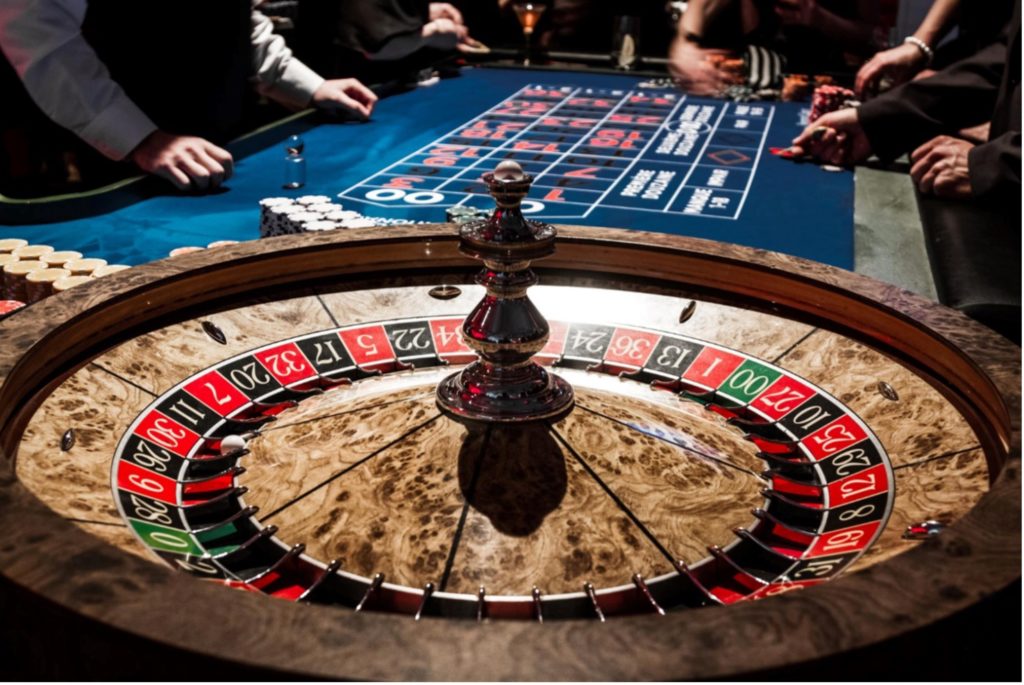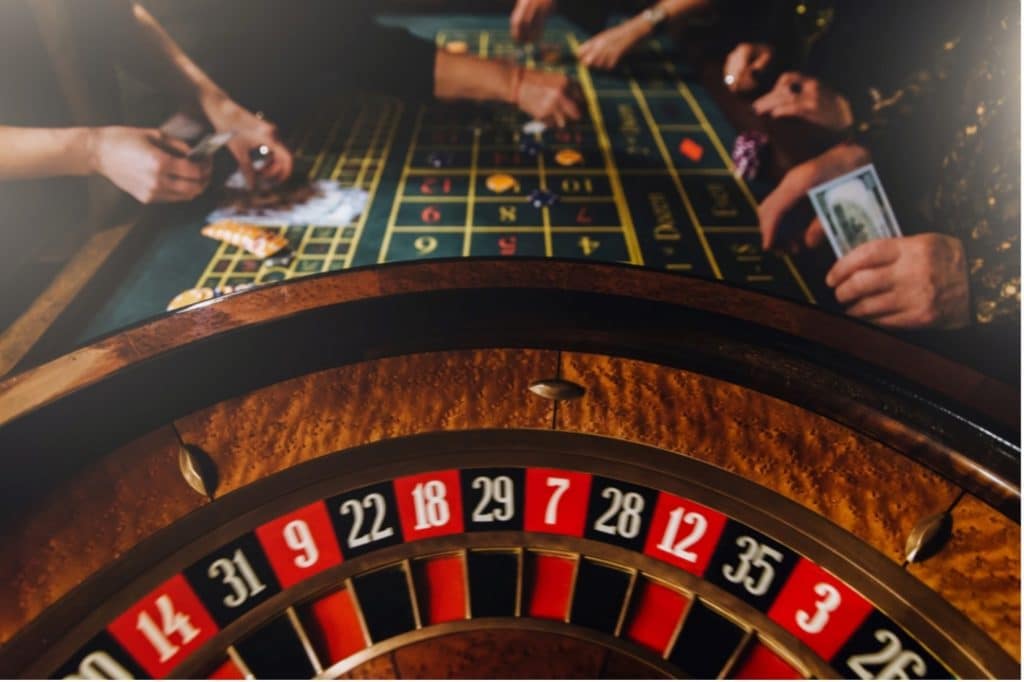Roulette, a classic casino game, embodies the thrill of chance. Its simplicity adds to its excitement, as players are gripped by watching the spinning wheel. The anticipation builds with the ball’s unpredictable bounce, the suspense lasting until it settles into a pocket. With diverse betting options, from specific numbers to colors, players can strategize or opt for a spontaneous choice, each round offering a fresh bout of excitement.
The game’s inclusive nature welcomes those who are still learning how to play roulette, and seasoned gamblers, creating a communal atmosphere of anticipation and excitement around the roulette table. The potential for a big payout on a small bet amplifies the exhilaration, making roulette an exciting and thrilling experience. But how to play roulette and win? Get all the answers you need in this article.

The best roulette strategy to win
While roulette is a game of chance, various strategies can optimize a player’s odds of winning.
These systems are grounded in mathematical principles, offering structured betting approaches that manage risk while enhancing the potential for profit. For instance, some strategies involve adjusting bets based on previous outcomes, capitalizing on winning streaks, or mitigating losses during less fortunate runs.
Discerning players often employ tactics that spread their risks across the betting layout, encompassing a wider array of numbers or focusing on outside bets that, while offering smaller payouts, have a higher probability of occurring. It’s important to understand that while no strategy guarantees success, they can significantly influence play style, decision-making, and bankroll management, potentially prolonging a player’s stay at the table and increasing the chances of a favorable outcome.
Three major things can enhance a player’s odds and overall experience:
- A deep understanding of the game’s mechanics.
- A well-chosen strategy.
- Disciplined betting.
If you are new to gambling and the concept of odds and wonder what are roulette odds is really about we recommend that you take some time to study this further as it can have a big impact on your success at the roulette table.
How to find the right roulette strategy
Navigating the different roulette strategies available requires a blend of understanding, and discernment. These strategies, diverse in nature, are rooted in various principles and betting methodologies, that are all designed to optimize the player’s odds of success to varying degrees depending on the context of the game.
Once grounded in the basics, players should explore the array of strategies with an analytical mindset. Critical to this exploration is a realistic assessment of one’s own risk tolerance and bankroll. No strategy is foolproof; each carries inherent risks and is subject to the house edge. Players must evaluate strategies not only on their theoretical merits but also through the lens of their personal comfort with risk.
Important things to remember:
- Roulette is a game of chance and there are no guarantees when using a roulette strategy.
- There are many different strategies each with their own advantages and downsides.
- It’s good idea to try out different strategies before focusing solely on one specific strategy.
- Testing strategies in simulated environments is not an ideal indicator whether a strategy works.
Different types of roulette strategies
There are two primary classifications of betting systems: progressive and non-progressive.
Progressive strategies are characterized by:
- An alteration in bet size based on the preceding round’s outcome.
- Aims either to recuperate losses or optimize wins
- Requires a robust bankroll and a high tolerance for risk due to potential steep increases in bets.
Non-progressive are instead characterized by:
- A system based on consistency.
- Thew bet remains constant or is varied according to a fixed scheme, irrespective of previous outcomes.
- Potentially less thrilling, but maintains a predictable risk level.
- Favors players who prioritize budget control and steadiness over the high-risk, high-reward nature of progressive systems.
Each category appeals to different player psychologies and objectives, underscoring the importance of personal risk assessment in strategy selection.
Elements that can influence roulette betting strategies
When it comes to the different strategies there are many elements that can influence the outcome of the game and thereby the effectiveness of a specific strategy. By being aware of these different elements one can better asses what roulette strategy will be most efficient. Some of the most common elements are:
Type of roulette game
The most common types of roulette games European and American roulette, while similar in appearance and gameplay, possess a significant difference that impacts betting strategies: the house edge.
- European roulette features a single zero, leading to a house edge of 2.7%
- American roulette includes an additional double zero, effectively doubling the house edge to 5.26%.

Type of roulette bets
The choice between inside and outside bets can also influence a betting strategy.
- Inside bets, such as single numbers, are high-risk but yield high rewards, suitable for aggressive strategies and players who prefer high stakes gambling with substantial payouts.
- Outside bets, like red or black and odd or even, offer lower payouts but a higher probability of winning, aligning with conservative strategies focused on sustaining the bankroll and prolonging gameplay.
A balanced strategy often involves a mix of both, allowing for the thrill of large wins while mitigating risks. Understanding these betting options is crucial for players to tailor strategies that align with their risk tolerance and gambling goals.
Any betting limit
Betting limits in roulette are set by casinos to establish both a minimum and maximum stake allowed per spin. These limits directly influence a player’s betting strategy, particularly for those employing progressive systems that require increasing bet sizes.
- A low maximum limit hinders the effectiveness of such strategies, limiting a player’s ability to continue a sequence (like doubling after a loss) beyond a certain point.
- Conversely, a high minimum might deter conservative players, pushing them to take higher risks.
If you are one of those that prefer playing roulette on Ethereum roulette sites betting limits can also be an issue.
The best roulette strategies to win
Now that you have gained insight into the different playing styles and elements that can impact a roulette betting strategy, we will take a deeper look at the different strategies. Remember, since roulette is a game of chance none of these strategies will ensure you 20 or 30 roulette wins in a row, but they can help you play like a professional roulette player and increase your chances when it comes to how to win on the roulette.
There are several great strategies that one can use in order to make the most of their game. The two most famous ones are probably the Martingale system and the Paroli system, which are used by a large number of players.
You can read more about why you should use a betting strategy here.
Finding the best roulette strategy for you
Identifying a roulette strategy that aligns with one’s personal playing style is crucial because it enhances the gaming experience, ensuring it remains enjoyable and within an individual’s comfort zone.
The right strategy complements a player’s risk tolerance, budget, and gameplay preferences, increasing the chances of a more rewarding experience. It promotes responsible gambling, as players are less likely to make impulsive or risky decisions that deviate from their natural inclinations and limits. Additionally, adopting a roulette strategy that fits your playing style can significantly enhance decision-making confidence.
It’s also essential for long-term engagement; players who find a strategy that resonates with their style are more likely to stay engaged and find satisfaction, regardless of the game’s outcome.
Remember, roulette is a game of chance, and while strategies can’t predict outcomes, they can help increase one’s chances of winning.
Key factors to consider:
- Your knowledge of the game
- Your level of experience
- The risks you are willing to take

Roulette tips:
Now that you’re equipped with the fundamental knowledge about roulette strategies, we want to conclude by sharing our best tips for playing roulette. Navigating the roulette table can be intimidating, but with the right pointers, you can make decisions that enhance your overall performance and make it more fun to play.
The following tips includes strategic betting, understanding odds, etiquette, and the importance of setting realistic expectations. So, before you place your chips on the table, let’s explore these essential guidelines that could significantly influence your roulette experience.
- Understand how to Bet
Understand the difference between inside bets (specific numbers) and outside bets (odd/even, red/black, etc.). Outside bets have better odds at winning, but smaller payouts.
- Understand the Odds
Before betting, know the odds of each bet type in roulette. Remember, a single number win pays more because the odds of winning are lower.
- Betting Strategies
Study different roulette strategies like Martingale, D’Alembert, and Fibonacci, but remember no system guarantees success. Always see them as guides and not as a tool to make you win.
- European Roulette vs. American Roulette
Whenever possible, choose European Roulette over American. The absence of the “00” in the European version improves the odds slightly in favor of the player.
- Practice with Free Games
Before wagering real money, try free roulette games to understand the rules and , practice, develop, and perfect your strategy.
- Bankroll Management:
Set a budget before you start playing and stick to it. Decide on a specific amount you’re willing to lose, and never bet money you can’t afford to lose.
- Avoid Emotional Betting
Make strategic decisions and avoid increasing bets to recover losses. Emotional play leads to poor judgment and loss of money.
- Keep Sessions Short
The house always has an edge. The longer you play, the higher the chances that the house will win. Set a time limit for your playing sessions.
- Use Bonuses Wisely
If playing online, for example on Bitcoion roulette sites, take advantage of welcome bonuses and promotions, but be sure to read the terms and conditions first.
- Enjoy the Experience
Remember that roulette is a game of chance. Enjoy the thrill, but don’t expect to win consistently. The key to a great experience is playing responsibly and for fun.
FAQ
Is roulette 50/50?
Roulette is not a 50/50 game. While bets like red or black, odd, or even, seem to offer a 50% chance, the green zero(s) on the wheel alter this. In European roulette, the presence of one “0” gives true odds of about 48.6%, and in American roulette, the “0” and “00” decrease the odds to approximately 47.4%.
How to win on the roulette?
Winning at roulette requires understanding the odds and table layout, managing your bankroll, and making bets that correspond to your risk tolerance. Remember, no strategy guarantees consistent wins; roulette is a game of chance, but wise betting and understanding payout structures can enhance your chances.
What is the safest roulette strategy?
The safest roulette strategy is often the outside bets – betting on colors (red/black) or even/odd numbers. These bets offer close to a 50% chance of winning, with payouts usually at 1:1. They’re considered safe because they involve less risk, but they also come with smaller rewards.
What is the most effective roulette strategy?
Effectiveness in roulette is subjective, but the Martingale System is popular for its simplicity. It involves doubling your bet after every loss, so the first win recovers all previous losses plus a profit. However, it requires a significant bankroll and doesn’t guarantee success.
What is the most profitable roulette strategy?
The most profitable strategy can be placing straight bets on single numbers. They have the highest payout at 35:1, but also the lowest probability of occurring. It’s high-risk, high-reward, and requires a good deal of luck. Consistent profits are hard to sustain over time due to the house edge.
What is statistically the best roulette strategy?
Statistically, there isn’t a “best” roulette strategy because the house always maintains a mathematical edge. However, European Roulette has a lower house edge compared to American Roulette due to the absence of the double zero, making outside bets on a European wheel a statistically better option.
Does the Fibonacci system work in roulette?
The Fibonacci system, where you follow the Fibonacci sequence (1,1,2,3,5,8…) for your bet sizing, can help manage losses but doesn’t alter the house edge. Like other betting systems, it doesn’t guarantee profits and requires a substantial bankroll to sustain during long losing streaks.
Do casinos allow Martingale roulette?
Most casinos don’t explicitly forbid the Martingale strategy, but instead circumvent its effectiveness by imposing table limits. These betting limits prevent continuous doubling of bets, eventually disrupting the Martingale system, which relies on this method to recoup losses and garner a small profit.
What are the odds on James Bond roulette strategy?
The James Bond strategy, which involves spreading bets on the table, typically has a success rate of about 67.6%, considering that you’re covering 18 of the 37 possible outcomes on a European wheel. However, the strategy doesn’t overcome the house edge, and losses can be significant if the ball lands on the 0 or outside the covered sections.












